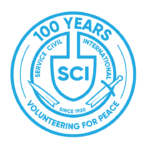“Peace is inextricably linked with equality between women and men” – UN Security Council.
Gender refers to how women’s and men’s roles, social relationships and expectations are built by society. Different cultures have different ideas of what is suitable for men and women to do and to be. This often changes within a culture during a crisis situation like war, when women may take on traditional male roles.
“People are born female and male, but learn to be girls and boys who grow into women and men. They are taught what the appropriate behaviour and attitudes, roles and activities should be for them, and how they should relate to other people. This learned behaviour is what makes up gender identity and determines gender roles, which are made to seem natural and ‘the norm’.” – Diakonia Council of Churches, South Africa.
Boys are socialised to deny feelings, compete with or dominate others, and are often brutalised to prepare them for military service. Girls are socialised to deny their intellect, to place the needs of others first and to remain passive and silent in the face of injustice. Women are socialised to be ‘carers’ and this may be one reason that 85% of IVP volunteers are female.
Gender is also about the power balance between men and women. Women are under-represented in all levels of decision-making, law-making and law-keeping. Because the experiences of males are seen as ‘normal’, women’s experiences are marginalized. These two factors can result in women and girls having little or no say in decisions that affect their lives. There is a need for more women in leadership and for processes to be made more transparent and accountable.
Ideas about masculinity and femininity lie at the roots of violence and are used to support armed conflicts. There is a continuum of violence, from domestic violence to violence in the public sphere, which every peace and justice movement must challenge. UNESCO’s Women and a culture of peace programme states: “Gender inequality and inequity are themselves major causes of the culture of violence and mechanisms for its perpetuation”.
In conflict situations it is women and children who suffer the most, yet women are often the first to reach across ethnic and religious divides in order to rebuild communities torn apart by violence. Women’s different perspectives are a valuable resource in the peace process. The silence around sexual violence against men and boys during war must also be broken.
Gender awareness is important for all peace and justice movements. Because gender is constructed by society, harmful stereotypical notions of male and female roles can be challenged. Gender justice must encourage the greatest possible participation of both women and men on equal terms in society. Gender equality is a necessary pillar in building a culture of peace.
United Nations Resolution 1325 (Adopted by the Security Council, Oct 2000)
Engendering IFOR – June 2002, p.17-20
UNESCO: Women and a culture of peace programme.

